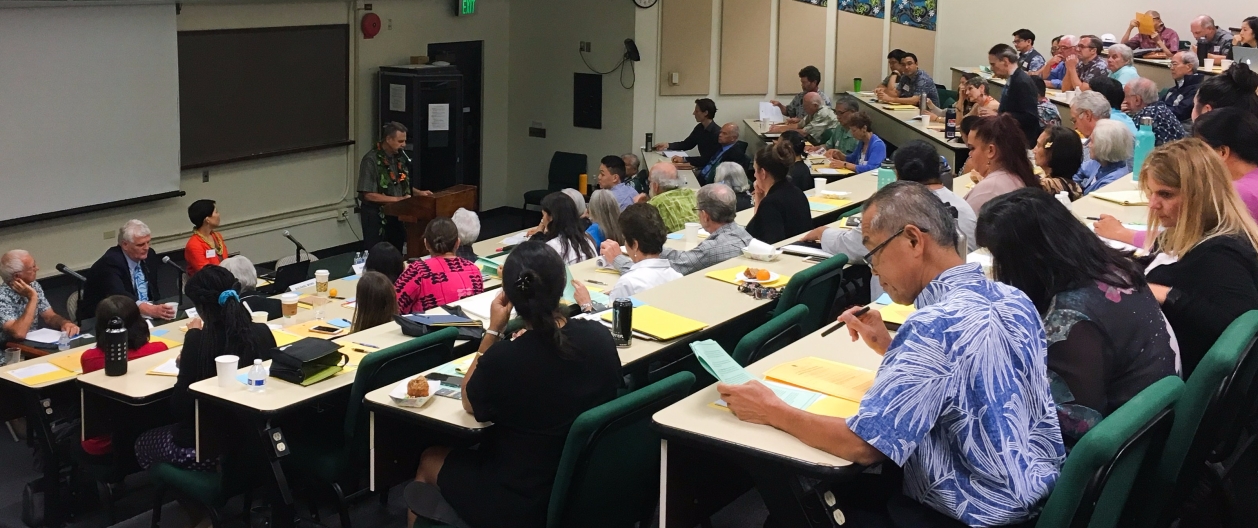Written by: Kara Doles
Kara Doles is Legal Aid Society of Hawaii’s Technology Project Coordinator, and has been working with the Microsoft, LSC and Pro Bono Net teams on the Simplifying Legal Help portal pilot in Hawaii. Hawaii was selected as a pilot project because of their demonstrated track record in establishing new and collaborative resources for meeting civil legal needs; their embrace of technology’s potential to expand access to legal assistance; and their vision of partnering with allied non-legal networks such as social services, public libraries, and health care institutions to help people identify and resolve their legal issues and related social needs. Learn more about why Hawaii was selected in our previous post.
Prior to her work on the portal project in Hawaii, Kara served as an AmeriCorps Advocate with the Legal Aid Society of Hawaii’s Intake Unit and Center for Equal Justice after earning a Bachelor of Arts degree in French language and Philosophy (law and ethics focus) from the University of Hawaii at Manoa. In this piece she discusses her experience at the Hawaii Access to Justice Conference in 2018.
Conference attendees comprised of lawyers, non-attorney advocates, judges, court staff, government officials, social service providers, and community members came together to be invigorated and inspired by the 2018 Hawaii Access to Justice Conference, “Fighting for Access to Justice for All,” held on June 29 at the William S. Richardson School of Law. Sponsored annually by the Hawaii Access to Justice Commission, this conference offered a unique forum of engagement around initiatives and programs that aim to expand access to the civil justice system.

The Hawaii Access to Justice Commission was established in 2008 by the Supreme Court of the State of Hawaii in response to the findings of representatives from several legal organizations concerning the unmet legal needs of Hawaii’s low and moderate-income residents. Among other notable conclusions, it was determined that significant barriers to obtaining legal assistance in Hawaii, in addition to an inability to afford an attorney, include language and cultural barriers, lack of knowledge of one’s legal rights, lack of knowledge of available legal services, and difficulty in accessing legal services programs.
Friday’s conference atmosphere buzzed with eager and hopeful change agents who devote their life’s work to “making music with what is left.” This analogy was brought to life by Rachael Wong of the Department of Human Services in her session, “Collaborations and Innovation for Equal Justice” during which she emphasized two ways to reach more people and extend scope: 1) Partnerships with new allies; and 2) Use of Technology. Amidst a group of people who collectively want to make progress in this area, there always remains the question of “Where do we go from here?” Rachael suggests connecting and collaborating with new partners such as libraries, folks in the health care industry, and navigators in the community. Additionally, she stressed the importance of leveraging resources and getting more impact for existing resources through the use of technology and creation of online options.

The one day conference covered topics including Worker’s Rights for the Low-Income Employee, Sexual Harassment and Access to Justice, Access to Justice for Immigrants, Technology in Mediation, Expanding Civil Access to Justice in Prisons and Jails, and Ensuring Access to Justice with the Revival of the Hawaiian Language. Attendees were also very excited to learn about the Legal Access Platform’s progress and future plans in the session, “Incubating Innovation in Access to Justice through Technology: The Microsoft Legal Access Platform” where panelists Nalani Fujimori Kaina, Executive Director of Legal Aid Society of Hawaii, Carly Ichiki, Lead Project Manager at Microsoft, and Suzanne Brown-McBride, Consultant with Pew Charitable Trusts discussed and clarified the platform’s objective. Session attendees were fortunate to hear three different perspectives, and discover how this project is truly a collective effort of many players working to merge the legal and technology worlds together. Participants were especially intrigued about the artificial intelligence and machine learning elements, and raised questions about cultural language nuances (“pidgin”), access for LEP persons, and the platform being a trusted source. All things considered, panelists received overwhelming positive feedback on how the advent of this tool symbolizes a remarkable milestone in educating and empowering pro se litigants across the Aloha state.
This project has been of significant and ongoing interest to the legal, social, and human services communities in Hawaii as it promises to produce a resource critical to solving multi-dimensional legal issues affecting the most vulnerable in the state. The 2018 Access to Justice Conference attendees left the day feeling more hopeful, connected, and encouraged to keep charging forward as Hawaii leads the nation in making access to justice a reality for all people to another level.
